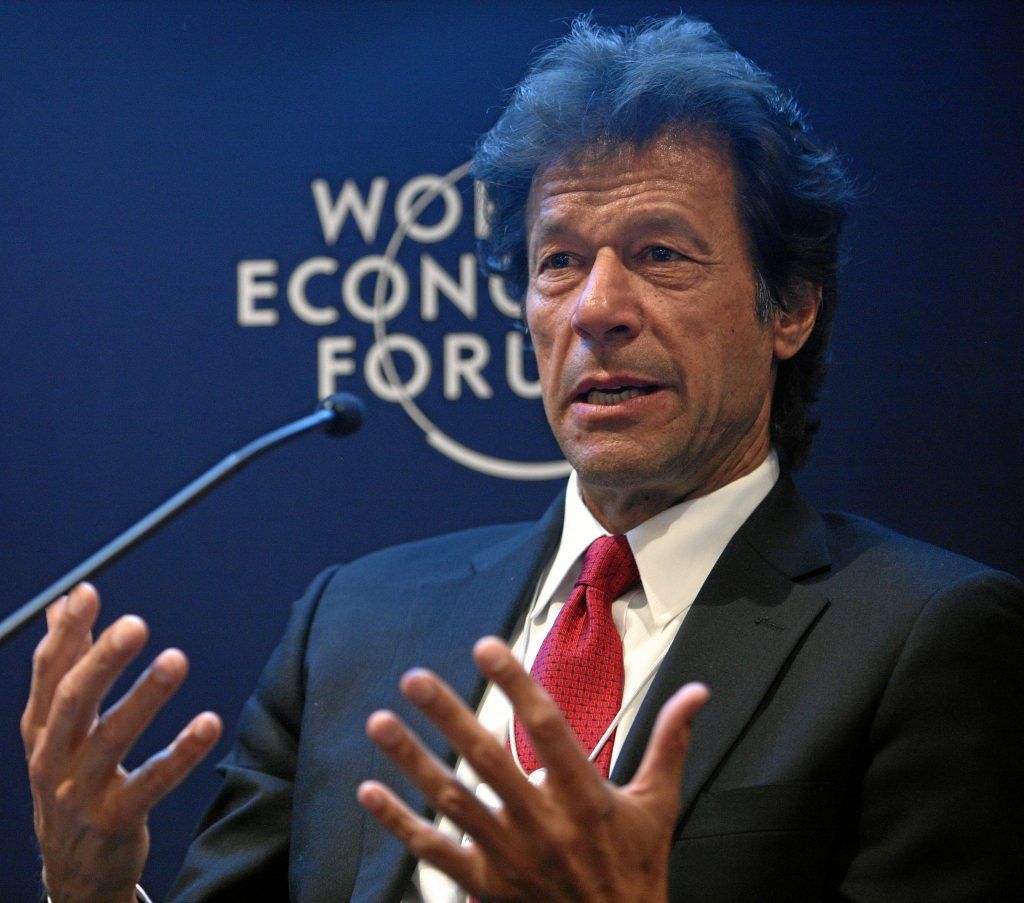Managing Pakistan’s Bomb: Learning on the job
By Pervez Hoodbhoy, Zia Mian | August 17, 2018
 Imran Khan, at the 2012 World Economic Forum. Photo by Remy Steinegger, World Economic Forum, swiss-image.ch/ .
Imran Khan, at the 2012 World Economic Forum. Photo by Remy Steinegger, World Economic Forum, swiss-image.ch/ .
On Saturday, Imran Khan will be sworn in as the next prime minister of Pakistan. His has been a sudden and rapid rise to power; he first came into politics in the late 1990s with no experience and has never held any government office. In his first public address to the nation after winning the July election, with Pakistan’s economy near bankruptcy, Khan said, “The biggest challenge we are facing is the economic crisis.” While this may well be the most pressing issue, the biggest and most important challenge Imran Khan will confront as prime minister is something he did not mention at all in his speech—how to manage the Bomb. The lives and well-being of Pakistan’s 200 million citizens and countless millions in India and elsewhere depend on how well he deals with the doomsday machine Pakistan’s Army and nuclear complex have worked so hard to build.
To be fair, it is not clear that Imran Khan will have much choice regarding nuclear policy. For Pakistani politicians, the options largely come down to either support the Bomb, or keep quiet about it. Like other prime ministers before him, Imran Khan may go and have his picture taken with the missiles that will carry nuclear warheads and pose with the scientists and engineers that make them and the military units that plan and train to fire them.
Imran Khan’s two-decade-long political career overlaps with the creation of Pakistan’s nuclear arsenal, but he has had very little to say about the Bomb. When he has spoken, it has been as a Bomb supporter. In 1998, as India and Pakistan tested their Bombs, Imran Khan told the BBC, “The test had to be done to tell India that Pakistan had a Bomb, because there was a lot of ambiguity on whether we had the Bomb. My party was clear that we had to tell India that we had a deterrent.” He claimed the Bomb as proof of Pakistan’s possibilities, telling the BBC that “[i]f it can have scientists that develop nuclear bombs then we can develop our own country.”
Imran Khan also has courted the support of Abdul Qadeer Khan (no relation), the man most closely identified in Pakistani minds with the country’s Bomb. This was after A.Q. Khan admitted publicly in 2004 to selling Iran, North Korea, and Libya the uranium enrichment centrifuge technology he had earlier stolen from European companies and copied for Pakistan and sharing nuclear weapon designs with other countries. He was quickly pardoned and placed under house arrest, but released in 2009.
This history suggests that Imran Khan may be likely to support the continued build-up of Pakistan’s nuclear arsenal. It is estimated that the arsenal now is on the order of 150 nuclear weapons, with Pakistan being able soon to deliver these weapons from airplanes (either via bombs or cruise missiles), on land-based ballistic missiles and cruise missiles, and on cruise missiles launched from submarines.
Few knowledgeable observers now doubt that Pakistan’s Army helped bring Imran Khan victory in the 2018 elections by stifling other political parties and silencing key voices in the media. Given the debt he owes to those who made his election possible, it is unlikely he will now try to assert himself and push for some kind of democratic civilian control in nuclear matters and in foreign policy generally. More likely, the Army will expect Imran Khan’s government to be cheerleaders in support of its next military adventure. All the pieces are in place.
Military crises have occurred in the subcontinent with awful frequency in recent decades, despite the Bomb, and perhaps because of it. Pakistan and India have survived at least five since 1987, giving both sides misplaced confidence that they will survive the next, too. This, in turn, leads to a lessening of political restraints on the militaries of both countries and greater nuclear brinksmanship.
As Pakistan discovered during the 1999 Kargil crisis, the combination of the Army, the Bomb, and pliant politicians leads to big mistakes. Prime Minister Nawaz Sharif, the chosen political tool of the Army in those days, was led to believe by General Pervez Musharraf, the head of Pakistan’s Army, that he had a plan for the liberation of Kashmir. General Musharraf’s foray over the Line of Control—the effective border between India and Pakistan in the Kashmir region—at first took the Indians by surprise then slowed, stalled, and finally crashed. Indian air power and artillery began decimating Pakistani forces, leaving Pakistan with a stark choice: withdrawal, a wider war, or brandishing nuclear weapons.
The world watched and judged. Pakistan was deemed the aggressor. The belief that China would bail out Pakistan was proven false. Musharraf and Sharif each visited China seeking support; both returned empty handed. Then, on July 3, 1999, Sharif made a desperate, uninvited dash to Washington for help. He eventually was willing to challenge the wisdom of his generals, but only when the situation had become desperate and nuclear war appeared to be terrifyingly close—and when the Americans were on his side.
Strobe Talbott, then US deputy secretary of state, records that “on the eve of Sharif’s arrival, we learned that Pakistan might be preparing its nuclear forces for deployment. There was, among those of us preparing for the meeting, a sense of vast and nearly unprecedented peril.” Faced with a situation where he did not know what his own army was up to, a shocked and subdued Sharif signed the withdrawal document. The prime minister was overthrown three months later in a military coup led by Gen. Pervez Musharraf.
Not long afterwards, Islamist militants backed by Pakistan attacked India’s Parliament, triggering massive military deployments by both countries and an intense military crisis that lasted until October 2002. In July 2006 and again in November 2008, Islamist militants believed to be linked to Pakistan attacked the Indian city of Mumbai, killing and wounding hundreds of people and again raising the prospect of a military response. Since then, the focus of conflict has shifted back to the Line of Control dividing Kashmir. India and Pakistan blame each other for hundreds of violations of the ceasefire agreed in 2003, with hundreds of military and civilian casualties and India citing hundreds of attempts each year by militants to cross over from Pakistan.
In Indian-occupied Kashmir demands for greater autonomy and independence have met with repression, which has fueled Kashmiri resistance. Human rights violations have become chronic. The Office of the United Nations High Commissioner for Human Rights reported in 2018 that in the past two years “Indian security forces used excessive force that led to unlawful killings and a very high number of injuries” while militant groups were held responsible for “a wide range of human rights abuses, including kidnappings and killings of civilians and sexual violence.” Some of the militant groups fighting in Kashmir are based in Pakistan and backed by the Army.
Peace does not seem to be in the cards. The Pakistan Army’s low-cost option is to keep the pot boiling in Kashmir and elsewhere in India, but not to let it boil over. It has secretly sponsored Islamist proxies to do its dirty work, and their footprint can be seen across Pakistan. Some Islamist groups have been supported to form political parties and successfully run candidates for elections. It is unlikely that Imran Khan will choose to move against these actors or rein them in; he has long demonstrated sympathy for the Taliban and other extremists. Any such action would be unwelcome to the Army and decried as a betrayal by his party base.
Whether triggered by Army action in Kashmir or by militant attacks, what happens if the next crisis comes on Imran Khan’s watch? To whom will he look for outside assistance, and will those allies come to his aid? Will he run to Washington, ala Nawaz Sharif? Imran Khan built his political base initially on harsh anti-American rhetoric. For a while he was dubbed “Taliban Khan” for his vehement condemnation of drone strikes against Islamist militants. Still, the United States has forgiven worse and will likely talk to him in a crisis. The risk of escalation to nuclear war in South Asia is too grave a concern to be ignored.
What has changed since Kargil? All semblance of trust between Pakistan and the United States is gone. The United States after the 9/11 attacks went to war in Afghanistan, and found that despite receiving vast amounts of US aid, Pakistan continued to back the Taliban. In 2018, this led to a cutoff in US security aid to Pakistan. But the lack of trust works both ways; many in Pakistan, including in the Army, see the United States as waiting to pounce upon and seize Pakistan’s nuclear weapons at the first opportunity.
Will Imran Khan then turn to China for support? His speech to the nation after the election suggests such a tendency, but before Pakistani military leaders conceive and implement another Kargil, they need to understand that China is not the new global superpower that has replaced the United States. A complex, four-way dynamic has emerged among India, Pakistan, China, and the United States. It is one that does not work in Pakistan’s favor.
China competes strategically with the United States and India, but it also trades heavily with both. There is no war talk and no visceral animosity among the members of this China-US-India triad. Pakistan touts China as an all-weather friend and expects protection, but the Kargil episode showed that these expectations were misplaced. India’s hawkish strategic elite sees Pakistan now as a Chinese proxy in the event of a Pak-India war, and India’s Army chief talks of fighting a two-front war. But in another crisis, China again may prove reticent to take Pakistan’s side and prefer to support de-escalation and an end to the crisis as quickly as possible.
Even the finest diplomacy may not work in the midst of a storm strong enough to knock over the pieces on the south Asian nuclear chessboard. With an emboldened army in Pakistan sooner or later seeking once again to push India to the brink—this time determined to escalate rather than back down if things go badly—staving off nuclear warfare on the subcontinent may be a race against time. Imran Khan needs to understand that the best way to handle a nuclear crisis is not to provoke one or try and use such a crisis for political advantage. Of course, an informed and organized public, able to keep political and military leaders in check and restrain them from brandishing nuclear weapons, would constitute a more enduring check on nuclear risk-taking. In Pakistan, however—with political leaders willing to let the military have effective control of key policies and stifle public discourse—this kind of active democracy seems a distant hope.
Together, we make the world safer.
The Bulletin elevates expert voices above the noise. But as an independent nonprofit organization, our operations depend on the support of readers like you. Help us continue to deliver quality journalism that holds leaders accountable. Your support of our work at any level is important. In return, we promise our coverage will be understandable, influential, vigilant, solution-oriented, and fair-minded. Together we can make a difference.
Keywords: Imran Khan, Pakistan
Topics: Analysis, Nuclear Risk, Nuclear Weapons

















I’ve read it, and agree it’s a good subject — Imran and the bomb. But it is padded with too much of interpreted history, and possible hasty extrapolation. Indian and Pakistani militaries are planning a Shanghai-led joint exercise in Russia in September to combat terrorism. To my mind that should suggest an optimum agreement by both sides on what constitutes terrorism. A Pakistani minister has just attended Vajpayee’s funeral. Modi greeted Imran. Things are happening, and it could be counter-productive to paint the situation as grim and the military as an incorrigibly self-seeking, suicidal gang. Are they that? We need… Read more »
I think “ruminating on old fears” wouldn’t really be helpful, as anyone close enough to this subject already knows the solution that one side must concede from this nuclear checkmate. However, Chess is not the game here, it’s about millions of lives that are valuable in this world and whilst Mr Khan doesn’t seem to have full policy control, I’m certain that being the “Batsman” for his first innings will give him many opportunities to hit in any direction. I remain optimistic for Mr Khan and the economic success of Pakistan as well as the peace and security situation. I… Read more »
Regardless of whether Pakistan or India would have supporters in the eventuality of a conflict, the damage will have to be borne, as uptill now by the countries themselves. With the increasingly loud din of impassioned extremist forces on either side, things could spiral out of control before one could realize where it is all going. History must be re visited essentially to realize how many a leader are left riding the tiger in such situations.